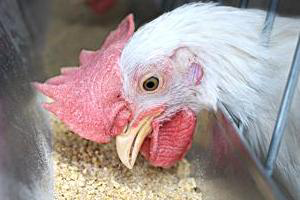Xylanase in broiler diets improves feed conversion

The objective of a study at the Texas A&M University, TX USA, was to evaluate the impact of feeding increasing concentrations of an experimental thermostable xylanase on growth performance and energy digestibility in male broilers.
The experimental design consisted of five dietary treatments, including a control diet without enzyme inclusion and the control diet supplemented with four increasing levels of xylanase (250, 500, 1000, and 2000 U/kg of diet). Each treatment included twelve replicate pens with 6 male broilers placed per pen (360 total chicks placed).
The dietary programme included a starter ration throughout the trial (day 1-21). The basal diet contained 30% wheat and 15% dried distiller’s grains with solubles (DDGS) and was pelleted at 87°C. Broilers were weighed and feed consumption determined on day 7, 14, and 21. On day 21, all broilers per replicate pen were necropsied, with ileal contents collected and pooled per replicate for the determination of ileal digestibility of energy. Titanium dioxide was utilized as an indigestible marker. No significant differences in body weight were observed between diets supplemented with xylanase and the control throughout the experiment.
The inclusion of xylanase at all inclusion rates improved Feed Conversion Ratio (FCR) on day 7, from day 15-21, and cumulatively at the completion of the experiment (day 1-21) with the inclusion of xylanase at all inclusion levels. A reduction in cumulative FCR through day 14 was observed in diets containing xylanase at 500 U/kg, 1000 U/ kg, and 2000 U/kg compared to the control diet.
A reduction in cumulative feed consumption was observed at day 21 in diets containing 500 U/kg and 2000 U/kg xylanase compared to the control. These improvements in FCR corresponded with increases in ileal digestible energy for diets containing xylanase at 500 U/kg, 1000 U/kg, and 2000 U/kg. These data confirm the ability of xylanase inclusion in starter diets containing wheat and DDGS to provide increased energy digestibility and improved FCR when fed to male broilers through 21 day of age.
Source: Jake Pieniazek, Mallori Williams, Joseph Klein, Jason Lee, Texas A&M University, College Station, TX USA
Proceedings International Poultry Scientific Forum (2014), Atlanta, GA, USA












